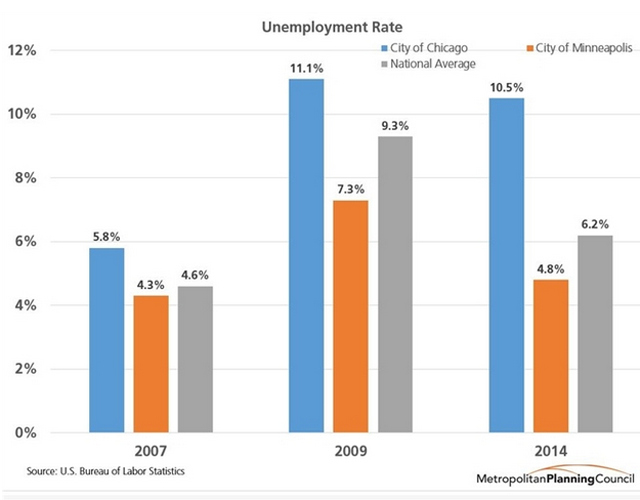Could More People Want To Move To Minneapolis Over Chicago?
By Rachel Cromidas in News on Apr 8, 2015 7:40PM
Many a think piece has been born out of the question of whether Chicago could be the next Detroit, if it continues to face deep budget woes and its population and job growth don’t keep pace with other major cities.
But how does Chicago compare to other Midwestern metropolises? Local nonprofit Metropolitan Planning Council recently published a study comparing Chicago with Minneapolis, 400 miles away to the northwest, which has experienced a surge of growth in recent years.
In contrast, Chicago’s population has stagnated, MPC says, according to census data (and after two particularly brutal winters, one can hardly go outside without hearing someone vow to leave the city forever). It's barely grown by .9 percent between 2010 and 2013, compared to Minneapolis, which has seen a 4.8 percent spike in population over the same period. Minneapolis’s success with attracting new residents, and with them new business ventures, even inspired the city’s mayor to set the goal of increasing the Minneapolis population by 500,000 people over the next ten years.
A mapping tool built by the Urban Institute projects that Minneapolis will come close to meeting that goal, if its population can grow by more than 20 percent over the next 15 years. In comparison, Chicago is only likely to grow by about 7.5 percent in the same time frame.
So what’s Minneapolis got that we don’t? The answer, MPC says, could lie in a number of factors. From economic growth, housing affordability and lower average commute times, to the less quantitative sentiment that Minneapolitans have a higher quality of life than other Midwesterners—subzero winters or not.
One thing that seems clear, according to researchers, is that growth begets growth. More jobs mean more people and more people often means better transit, public education, more diversity and a higher quality of life for people across the class spectrum. If all those factors makes a city a more attractive place to live, then expect to see more business growth and, you guessed it, more jobs. The cycle continues.
